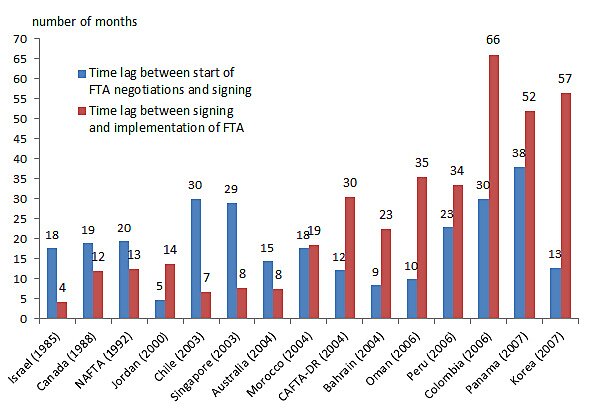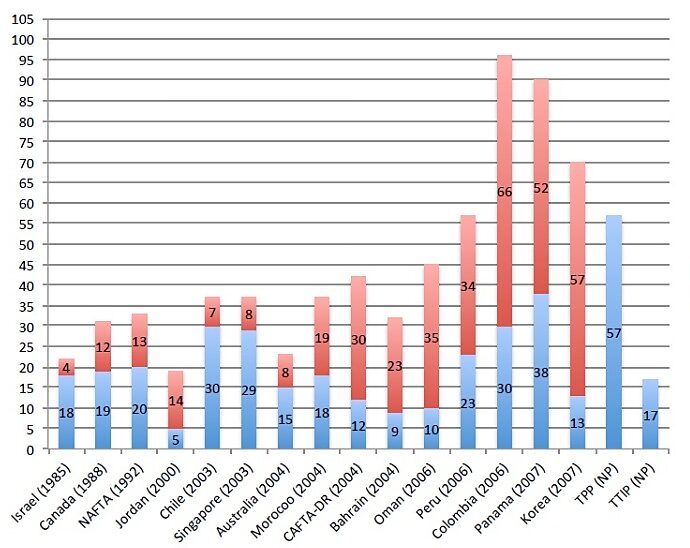With the Trans-Pacific Partnership (TPP) negotiations reported to be nearing completion and the Transatlantic Trade and Investment Partnership (TTIP) talks kicking into higher gear, Congress is expected to turn its attention to Trade Promotion Authority (TPA) legislation in the weeks ahead.
That’s where opponents of trade – mostly from the Left, but some from the Right – have decided to wage the next battle in their war against trade liberalization. Tactically, that makes some sense because, if they succeed, the TPP and the TTIP will be sidelined indefinitely. But, as observed by the Greek Tragedians and countless times in the millennia since, truth is the first casualty of war.
Trade opponents characterize TPA as an executive power-grab, a legislative capitulation, and a blank check from Congress that entitles the president to negotiate trade deals in secret without any congressional input except the right to vote “yea” or “nay” on an unalterable, unamendable, completed and signed agreement. But the truth is that TPA does not cede any authority from one branch to the other, but makes exercise of that authority more practicable for both branches.
Under the Constitution, Article I, Section 8, Congress is given the authority to “regulate commerce with foreign nations” and to “lay and collect taxes, duties, imposts, and excises.” While the president has no specific constitutional authority over trade, Article II grants the president power to make treaties with the advice and consent of the Senate. Accordingly, the formulation, negotiation, and implementation of trade agreements require the involvement and cooperation of both branches.
TPA allows the executive branch to negotiate trade deals with foreign governments on the basis of guidance from Congress, to be approved or not, under expedited legislative procedure by a subsequent up-or-down congressional vote on legislation to implement the agreement after it has been completed. That guidance includes articulation of Congress’s trade policy objectives, specific parameters, and other conditions that it expects the executive branch to meet in order for completed trade deals to receive the fast-track treatment of guaranteed, timely, up-or-down votes in both chambers without scope for amendments or filibusters. In other words, Congress does not relinquish its authority. It reiterates its authority by setting boundaries for the president.
Absent a grant of TPA, the executive branch would have difficulty concluding trade negotiations because foreign governments would be unlikely to put their best offers on the table without assurances that the agreement wouldn’t be unraveled by Congress. Put another way, TPA gives the president additional negotiating leverage by assuring trade partners that any agreement reached is final.
Every U.S. president since 1974 (when TPA was born as “Fast Track Negotiating Authority”) has been granted this authority by Congress to negotiate agreements to expand trade with other nations. Questions about whether this compact is proper and constitutional have been raised and answered affirmatively over the years by legal scholars. In 2002, former Attorney General Edwin Meese III and a colleague authored a legal memorandum for the Heritage Foundation, which found that TPA was “clearly constitutional” because:
Congress retains its authority to approve or reject all future trade agreements. It might be unconstitutional if Congress tried to delegate its authority to approve the final deal, but that is not at issue. Congress may always kill any future international trade agreement by withholding its final approval.
(More background on practical, legal, and constitutional matter here and here.)
In July 2013, President Obama requested that Congress reauthorize TPA, which elapsed six year earlier during the Bush administration. In January 2014, legislation to renew TPA—the Bipartisan Congressional Trade Priorities Act of 2014—was introduced in the House and Senate, but Congress did not act upon it, so new legislation will be required in the 114th Congress.
Although support for renewal of TPA is stronger in the 114th Congress, there is likely going to be considerable debate about which congressional objectives, conditions, and parameters to include, and what shortcomings might trigger removal of an agreement from fast track consideration. That all makes for healthy and appropriate debate.



